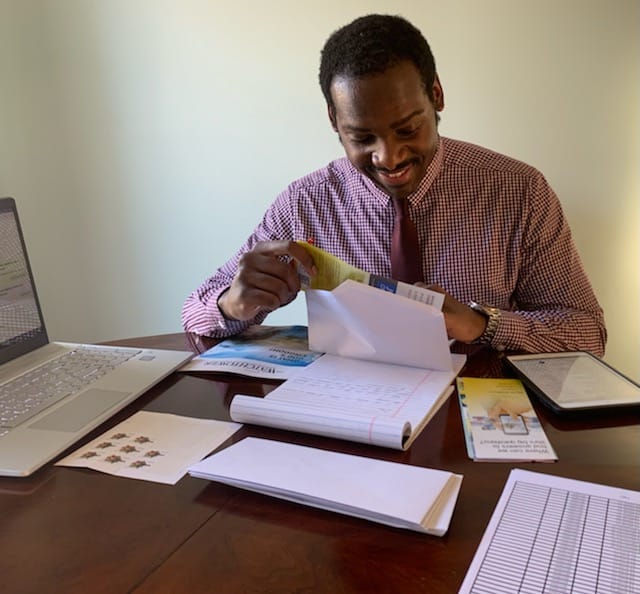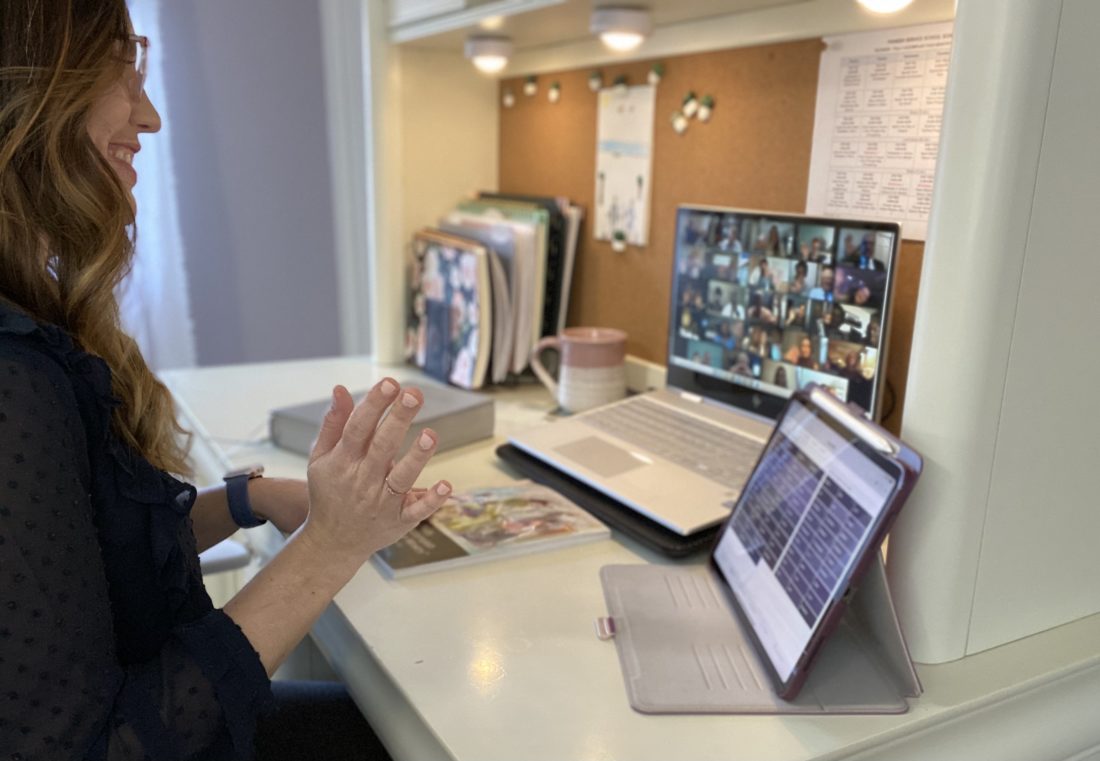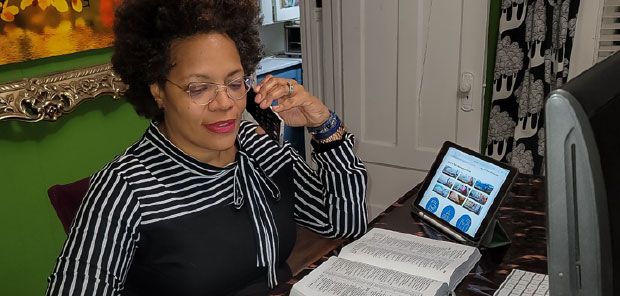A Year Without Knocking: Jehovah’s Witnesses Connect With Neighbors

Like most of the city’s gathering spaces, worship centers for Jehovah’s Witnesses – a group with nearly 10,000 members in Brooklyn alone – closed their doors indefinitely last March.
Since then, congregants have done most of the work of being a Witness at home, where they’ve gathered over Zoom for prayer twice a week in lieu of in-person services at their worship center, or Kingdom Hall. Individual bible study is now held over Zoom as well.

The direction to make these adjustments came swiftly at the start of the pandemic from JW’s U.S. Branch Committee in upstate New York, where the JW leaders, or Governing Body, oversee their operations worldwide.
Yet, with their iconic literature displays on sidewalks and in subway stations and custom of door-to-door ministry, Jehovah’s Witnesses are famously one of the city’s most public religious groups. Community outreach is baked into their practice; in addition to keeping services open to the public, they also work to get people of all faiths and denominations to consider signing up for individual bible study and to convert if they choose.
Witnessing is “part and parcel” of what Witnesses do, Robert Hendriks, JW National Spokesman, told Bklyner.
“We can’t be a Witness without testifying about our God, our creator, Jehovah God, and about his son Jesus Christ and his kingdom,” said Hendriks. “If you don’t witness on a regular basis, you’re no longer counted among active Witnesses in the world.” Witnessing is in their DNA, he explained.
“I grew up being taught to be one of Jehovah’s Witnesses by my mom,” Robert Donald, a Witness from East Flatbush, told Bklyner over the phone. “So I’ve literally always gone from door to door since I was a child.”
“We go to them because we feel an obligation to them, because we want to bring a message of comfort and good news, and it’s that love of neighbor that has moved us to do that,” Hendriks said. “And it’s the love of neighbor that has moved us to stop.”

But Jehovah’s Witnesses have long encouraged their members to explore alternatives to in-person Witnessing, Hendriks said. For those in Brooklyn in particular, where most people live in apartment buildings with buzzers or doormen, reaching neighbors has always been challenging.
“While door-to-door knocking and our public ministry was always the main way we would do it, it was clear that you know, you knock on a hundred doors in Brooklyn, and guess what? None of them are home. Or you can’t get into the building. So especially in the city, door knocking is not as effective.”
Instead of making their usual rounds in the neighborhood where their Kingdom Hall, Canarsie English Congregation, is located, Mr. Donald and his wife Tricia now do all of their ministries over the phone and through letter writing. Letters and calls are addressed to the same neighbors they would typically visit on their assigned routes. While it was a significant adjustment, explained Mrs. Donald, it was hardly new for them.
“We had different avenues of preaching already established,” she said. “The transition wasn’t extremely hard for most of us, because we’ve already engaged in it. So now it’s just a matter of it being our permanent situation.”

In the last year, Ms. Donald and her husband have written over a hundred letters between the two of them, compared with the roughly 20 letters they might have written in previous years. The Donalds have also encouraged their three young kids to help out as well, giving them an opportunity to work on their penmanship and letter-writing skills, the latter of which, Mrs. Donald said, is often not taught in public schools anymore.
“It gives us time as parents to give our children more biblical instruction,” Mrs. Donald said, “And instruction on just how to communicate with people because letter writing is a little different than just speaking.”
During the last year, Mrs. Donald said, correspondence has mostly been geared toward giving people comfort and a sense of hope for the future.
“We were sending mostly encouraging thoughts, like ‘how are you coping with the pandemic?’ especially more towards the beginning, when everyone was really frustrated, scared,” she said. “The letters were encouraging letters – direction from the bible, how to receive encouragement. Reminding the individual that Jehovah God is a loving God, and that he’s a God of comfort.”
Those letters have reached many individuals who, Mrs. Donald explained, had been “praying” that someone might reach out – people struggling with the loss of loved ones or a general sense of hopelessness.
“I’ve had the opportunity of speaking with one person in particular who felt like there was really…the situation was despair, it was very bleak for them,” she said. “But at the end of the conversation, I felt like we really did connect. I was able to help that individual see from the scriptures that there is a hope that can bring a relief to the despair that a lot of us are feeling right now.”
Zoraida Gonzalez, who worships at South Brooklyn Spanish Congregation in Sunset Park, told Bklyner that people have generally been more receptive to their witnessing since the pandemic began.
“We often found interest, where, in other times, they were probably not interested,” she said. “We’ve noticed that they want to talk – people want to express themselves. People want to express the pain they feel.”

“This pandemic has made a lot of people think about their lives,” said her husband, Samuel Gonzalez.
Former Brooklyn resident Asucena Cabrera received a call from a Jehovah’s Witness last March as she was grieving the loss of her husband of 20 years, who had passed away from COVID-19. After his death, she told Bklyner via a media representative for Jehovah’s Witnesses, who translated her response from Spanish, she questioned why God would allow this to happen, and couldn’t find the support she needed from her own religious community. The Witness she spoke to called her back every day for a week, and she ultimately decided to pursue bible study with them.
Following up is a major part of the practice.
“We return the call, we tell them we’re going to call back, we tell them when we’re going to call back,” said Mrs. Gonzalez. “That kind of helps us too – to see that other people also are willing to hear, and they need something positive in moments like this.”
Another Brooklyn Witness, Cedric Fagan, has been writing letters to people who are currently incarcerated. One man who had been in prison for more than 20 years had lost his faith in God, and his own religious institution hadn’t provided any of the answers he needed. Fagan sent him the scripture 4:8 from the Epistle of James. In response, he told Fagan that he would like to learn how to pray.
Will Jehovah’s Witnesses be knocking on doors across Brooklyn again come summer? No one can say for sure. But they are not discouraged by the lack of in-person witnessing.
“It doesn’t change the joy I have for being in the ministry,” Mr. Donald said.



